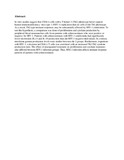| dc.description.abstract | In vitro studies suggest that CD4(+) cells with a T helper 2 (Th2) phenotype better support human immunodeficiency virus type 1 (HIV-1) replication than do cells of the Th1 phenotype. As a result, Th2-type immune responses may be substantially affected by HIV-1 coinfection. To test this hypothesis, a comparison was done of proliferation and cytokine production by peripheral blood mononuclear cells from patients with schistosomiasis who were positive or negative for HIV-1. Patients with schistosomiasis with HIV-1 coinfections had significantly lower interleukin (IL)-4 and IL-10 production than did HIV-1-negative individuals. In contrast, interferon-gamma production levels were similar between the 2 groups. Furthermore, in patients with HIV-1, a decrease in CD4(+) T cells was correlated with an increased Th1:Th2 cytokine production ratio. The effect of praziquantel treatment on proliferation and cytokine responses also differed between HIV-1 infection groups. Thus, HIV-1 infection affects immune response patterns of patients with schistosomiasis | en |

